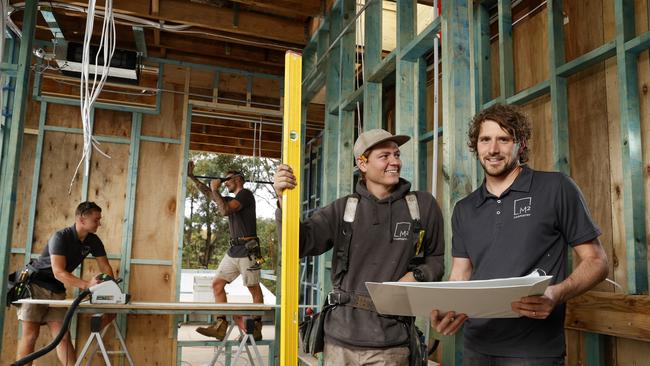TCorp plays the long game as RBA seen to struggle to tackle inflation
With higher inflation and lower market returns, the NSW state’s fund management arm is seeking diversification and arbitrage opportunities to face headwinds and preserve capital.

Australia’s central bank will struggle to bring inflation down towards the top of its target rate of 3 per cent, challenging pension funds to broaden the range of investments to position themselves for the next decade and beyond, according to TCorp, the NSW state’s fund management arm.
With excellent investment conditions prevalent since the global financial crisis now a thing of the past – such as falling bond rates, low inflation and ultra-high liquidity, TCorp chief investment officer Stewart Brentnall says the $110bn fund is now “preparing” for a challenging future with lower returns and higher volatility.
“Inflation is a lot higher, and in my opinion, because of wage pressure, the costs of energy transition and moving supply chains back on shore, will not come down to where it’s been in the last 10 years, around 2 pe recent,” he told The Australian in an interview.
“I think what we’re going to find is the Reserve Bank struggling to get inflation down to the top of their band of around the 3 per cent mark for the next few years. That’s challenging.”
With about 18 per cent of the portfolio invested in local and global property and infrastructure assets, Mr Brentnall keeps a close watch on the market dynamics.
Mr Brentnall said the higher interest rates and inflation will lead to double-digit writedowns in the valuations of Australia’s commercial properties this year, particularly for non-prime properties with high vacancies.
“We are seeing a couple of commercial property assets on the market in Sydney at the moment at discounts between 10 and 20 per cent from their independent net asset valuations. We believe that they are a reasonable signal of what’s to come,” he said.
Mr Brentnall – who oversees a 70-strong team managing assets backing NSW’s State Super defined benefit pensions, state insurance liabilities, as well as a special purpose funds – said diversification is key in this landscape. And part of that involved “broadening out the set of market beta opportunities that we are exploiting”.
Insurance-linked securities, provision of market liquidity and timberland investments, are a few areas the public sector investment manager has spotted to complement its already diversified investment portfolio as it seeks to protect its capital and take advantage of market dislocations.
Monthly inflation data last week showed a bigger than expected 6.8 per cent rise in the consumer price index in the year to April, raising the chances that the Reserve Bank of Australia lifts the cash rate on Tuesday above 4 per cent to control inflation.
That’s after the central bank hiked the cash rate 11 times in the last 13 months from a record low of 0.1 per cent to a decade high of 3.85 per cent, hurting the value of stocks, bonds and almost every other asset class.
Stressing the need to focus on capital preservation throughout the fund’s long investment horizon, Mr Brentnall said its philosophy is not to be too active, but in the current challenging landscape with expectations of lower returns and higher volatility, TCorp needed to be “more proactive” and selective in the types of investment opportunities it chose. Something he called “conservative dynamism”.
“The last pension for State Super will be paid well into the 2080s, the last insurance claim for icare will be paid well into the 2090s, if not into the 22nd century,” he said.
“So our approach is ‘prepare not predict’, and that means that we build very diversified portfolios, bringing a lot of resilience to different market conditions and different possible outcomes, including higher inflation for longer, a recession, possibly even some geopolitical events where the diversity of the portfolio will stand it in good stead. And ESG and sustainability is an important part of that resilience and diversity.”
With liquidity being drained from the system amid rising interest rates, arbitraging opportunities are emerging for cashed up investors to provide it in a number of corners in the market at much better prices than in recent years.
“Liquidity is being sucked out of markets, banks have tightened down their credit processes, and fund managers are not holding as much cash, so finding liquidity is more challenging,” Mr Brentnall said. “We are looking at insurance linked securities, which we researched in detail in 2017, and felt that the return opportunities then were terrible.”

With the frequency of extreme weather events such as storms and floods rising in recent years due to climate change, investors in insurance linked securities such as catastrophe bonds have suffered large losses and have withdrawn from the market.
“The required return for that insurance risk has gone up a lot versus its 2017 levels, given the escalation of recent claims and less capital flowing to this sector. It’s a much more attractive market now, so we’re looking at that closely.”
With climate related risks rising and driving higher demand for policies, insurers are funding some of those liabilities through their balance sheet but must reinsure the rest, driving reinsurance prices to the highest levels in decades.
“That’s where we’re playing, and in a quite broadly diversified way, not individual specific risks,” Mr Brentnall said.
TCorp was also adding exposures to fund managers looking to benefit from market inefficiencies, he said. That included short term and “opportunistic” funding of rebalancing trades to equity funds that need to buy or sell shares when they find themselves over or underweight certain stocks when indices are rebalanced at the end of the month or the quarter.
“Those transactions give rise to the opportunity for other players in the market to recognise that things are being done without a view on price, where assets are being sold below their fair values, and other assets are being bought above their fair values,” Mr Brentnall said.
“(That is) where there’s an opportunity to take the other side of those trades. They may be quite short horizon trades of a few days or a few weeks to crystallise the value out of that strategy.”
As part of its diversification strategy, the fund was also buying timberland assets as they are not typically correlated to returns of liquid assets such as bonds, equities, credit and currency.
“The value of those trees is not going to go up or down, because equity markets rise or fall. This is the attraction to us, the trees grow, and their valuation expands over time.”
“And yes, they’re subject to climate risk and possible bushfires. But on the other hand, they’re not correlated with equities or bonds. And that’s the real beauty of diversification and resilience in our portfolios.”
As of the end of March, TCorp’s growth funds – roughly about 68 per cent of the whole portfolio – had delivered returns of between 8 and 8.5 per cent over the 10-year horizon, according to a spokeswoman.
About 41 per cent of its portfolio is held in equities, and in the 12 months to March 31, it rebalanced some of that out of domestic shares into global shares to access larger and deeper markets. Domestic bonds and cash were also lowered in favour of credit with higher risk-adjusted returns, she said. TCorp’s allocation to credit grew one percentage point to 19 per cent in the 12 months to March 31.
It holds about 9 per cent in bonds and cash, and about 8 per cent in alternative investments, with about 6 per cent of its portfolio allocated to opportunistic and short term investments.





To join the conversation, please log in. Don't have an account? Register
Join the conversation, you are commenting as Logout